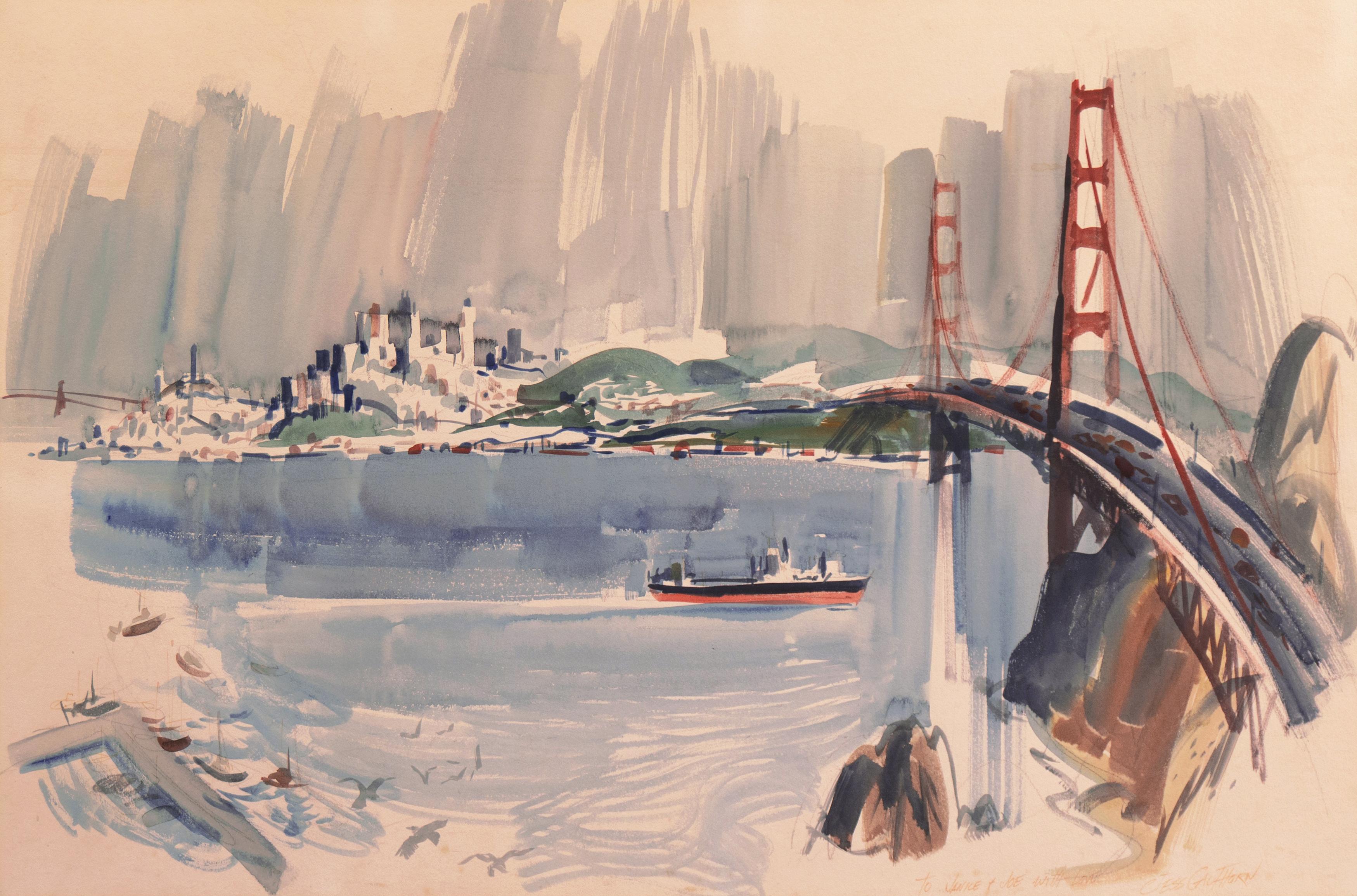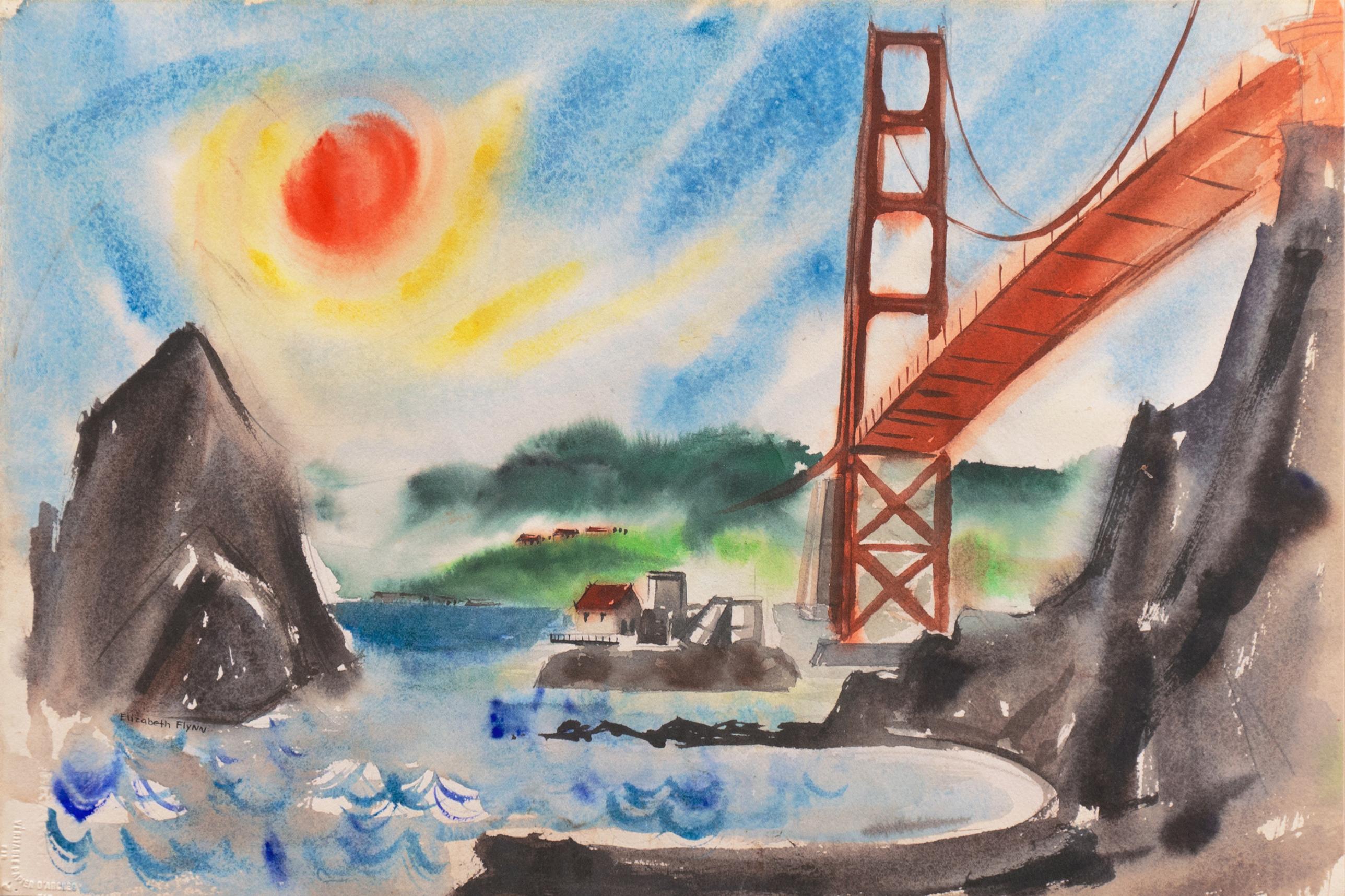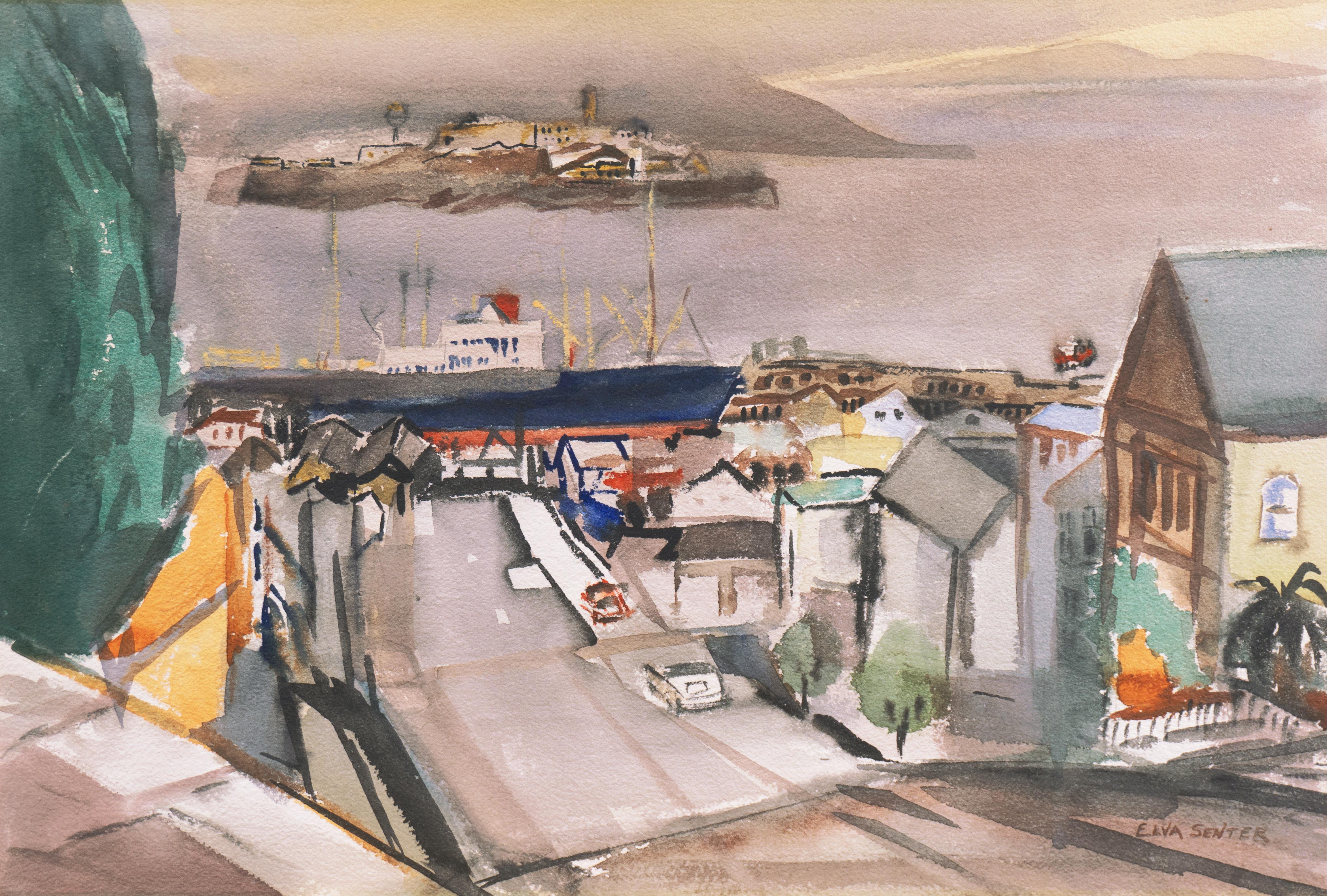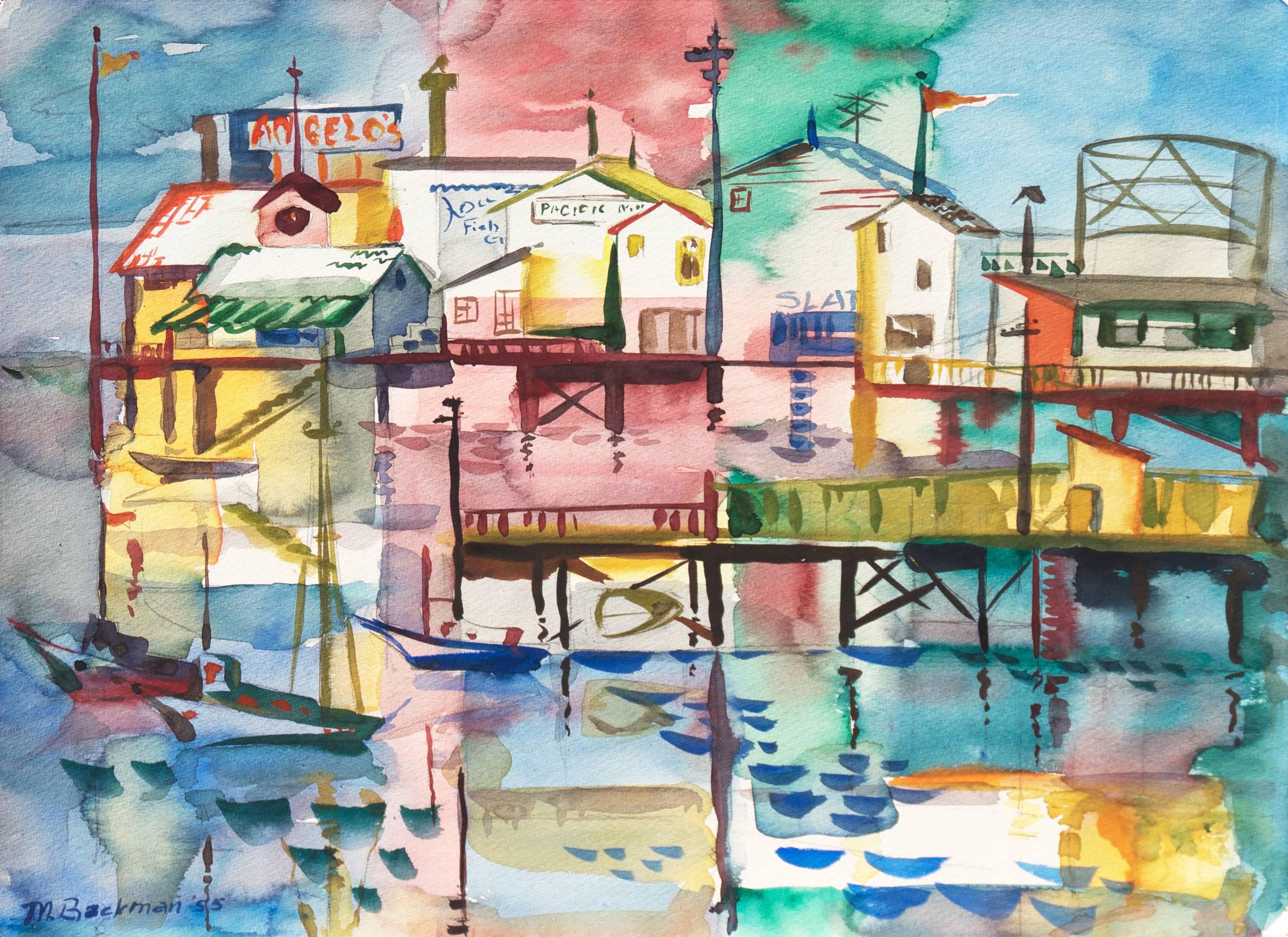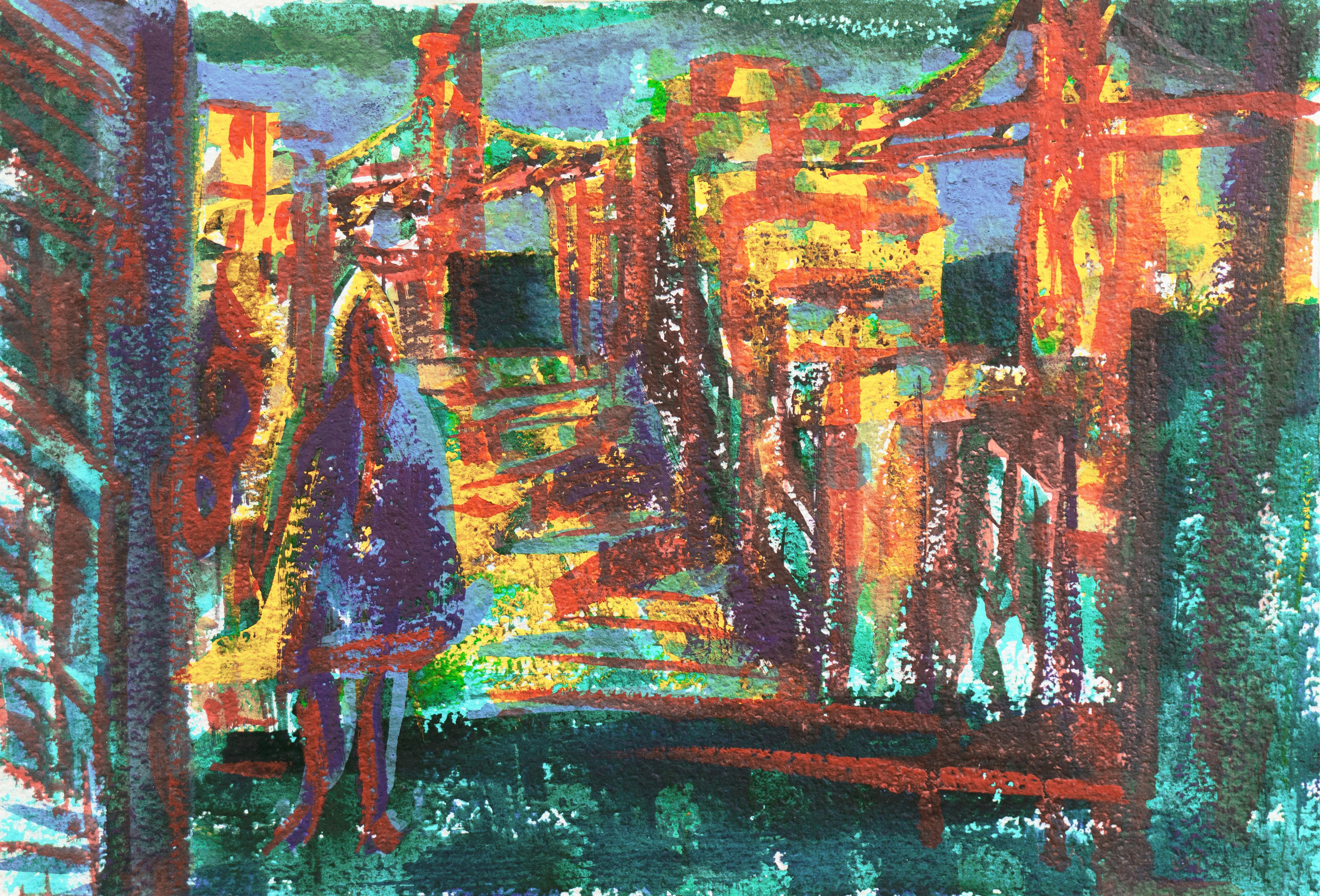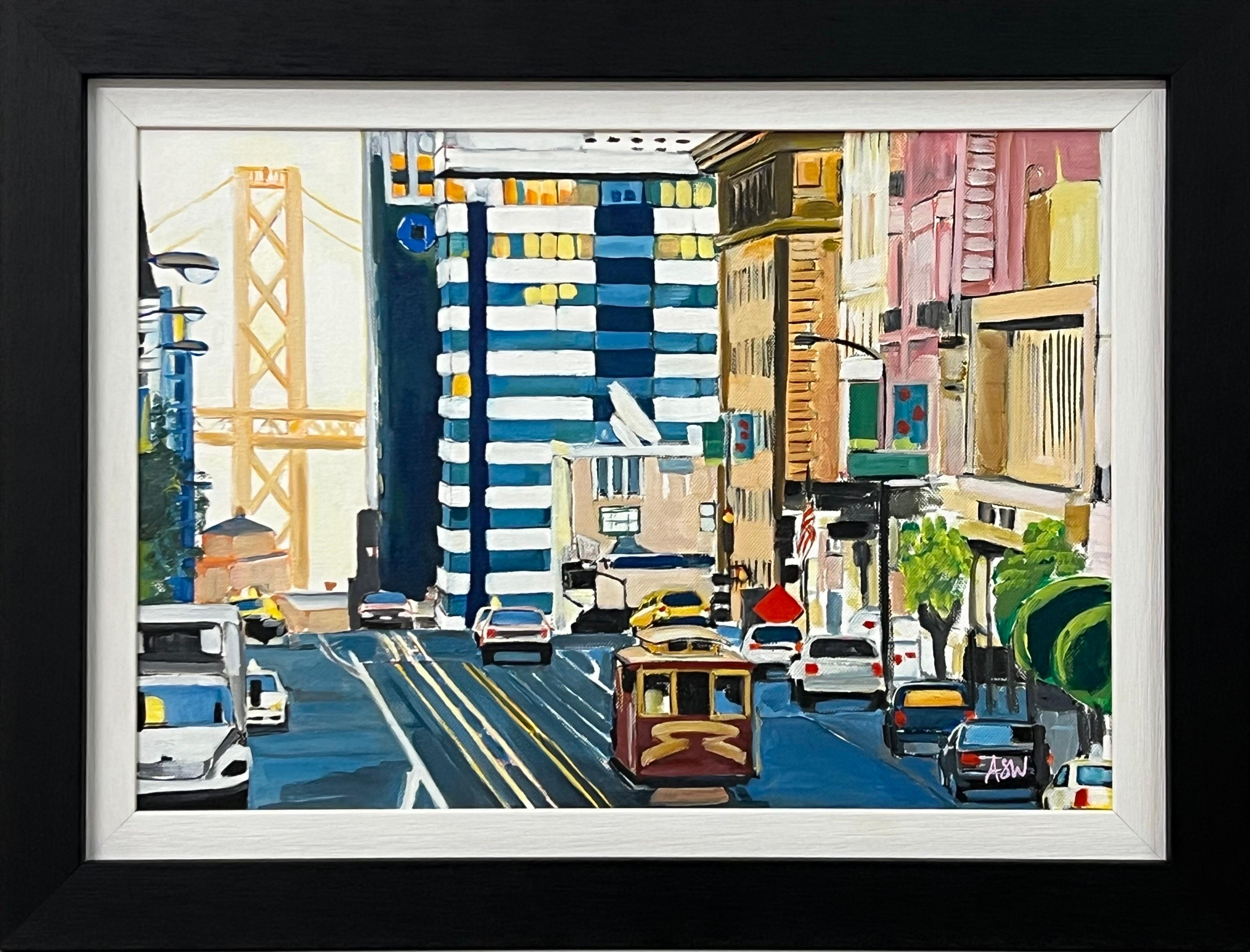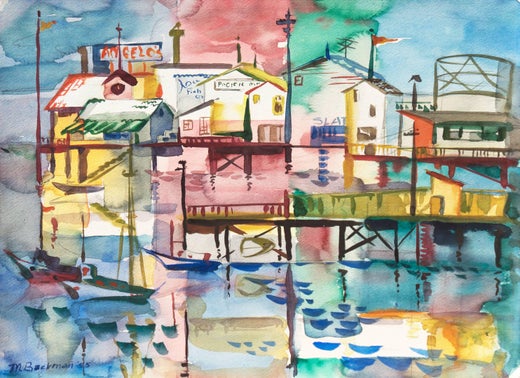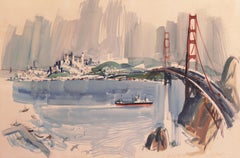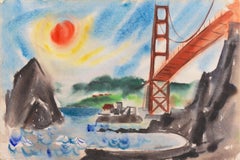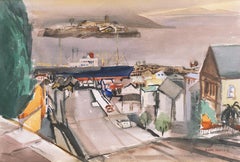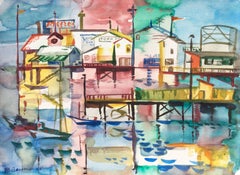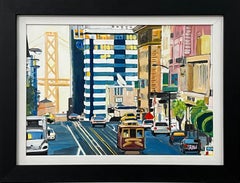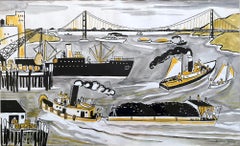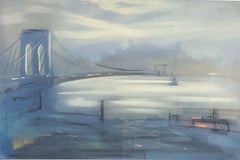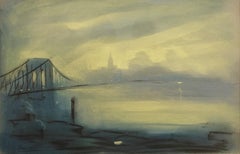Items Similar to 'Golden Gate, San Francisco', Bay Area Woman Modernist, Crocker Art Museum
Want more images or videos?
Request additional images or videos from the seller
1 of 10
Muriel Backman'Golden Gate, San Francisco', Bay Area Woman Modernist, Crocker Art MuseumCirca 1955
Circa 1955
$2,750
£2,086.64
€2,385.88
CA$3,841
A$4,270.67
CHF 2,229.91
MX$51,984.50
NOK 28,452.69
SEK 26,658.81
DKK 17,806.28
Shipping
Retrieving quote...The 1stDibs Promise:
Authenticity Guarantee,
Money-Back Guarantee,
24-Hour Cancellation
About the Item
Signed lower right "Muriel Backman" for Muriel Durgin Backman (American, 1902-1996) and titled verso "The Cool Gray City".
An elegant mid-century view of the San Francisco skyline and the bay with the Golden Gate in the foreground. A powerful and lyrical work by this notable California Modernist who exhibited with success from the 1930's through the 1950's at the Crocker Art Museum, the Kingsley Art Club, the Berkeley YWCA and the Santa Cruz Art League, among others. Muriel Backman is well-listed and her work is held in the permanent collection of the San Francisco Public Library.
Bibliography: "Santa Cruz Art League Statewide Art Exhibition Index, First through Twenty-seventh, 1928-1957 (Publications in California Art, No. 12)" Nancy Dustin Moure.
- Creator:Muriel Backman (1902 - 1996, American)
- Creation Year:Circa 1955
- Dimensions:Height: 15 in (38.1 cm)Width: 22.5 in (57.15 cm)
- Medium:
- Movement & Style:
- Period:
- Condition:Painted on Arches paper; age-toning; unframed.
- Gallery Location:Santa Cruz, CA
- Reference Number:1stDibs: LU344618382
Muriel Backman
Muriel Backman was born in 1902. She is well-listed in relevant art reference works, and her work is held in public and private collections, including the permanent collection of the San Francisco Public Library.
About the Seller
5.0
Platinum Seller
Premium sellers with a 4.7+ rating and 24-hour response times
Established in 1982
1stDibs seller since 2013
741 sales on 1stDibs
Typical response time: 1 hour
- ShippingRetrieving quote...Shipping from: Santa Cruz, CA
- Return Policy
Authenticity Guarantee
In the unlikely event there’s an issue with an item’s authenticity, contact us within 1 year for a full refund. DetailsMoney-Back Guarantee
If your item is not as described, is damaged in transit, or does not arrive, contact us within 7 days for a full refund. Details24-Hour Cancellation
You have a 24-hour grace period in which to reconsider your purchase, with no questions asked.Vetted Professional Sellers
Our world-class sellers must adhere to strict standards for service and quality, maintaining the integrity of our listings.Price-Match Guarantee
If you find that a seller listed the same item for a lower price elsewhere, we’ll match it.Trusted Global Delivery
Our best-in-class carrier network provides specialized shipping options worldwide, including custom delivery.More From This Seller
View All'San Francisco from Marin', Seattle, SAM, Frye Museum, Golden Gate, Sausalito
Located in Santa Cruz, CA
Signed lower right, 'Jess Cauthorn' (American, 1923-2005), painted circa 1960.
A respected fine artist art teacher who transformed the art-school scene...
Category
1960s Modern Landscape Drawings and Watercolors
Materials
Watercolor, Gouache, Illustration Board
'Golden Gate Bridge from Sausalito', Marin, Mid-century Modernist Watercolor
Located in Santa Cruz, CA
Signed lower left, 'Elizabeth Flynn' (American, 20th century) and painted circa 1965.
A sunny, modernist view of California's Golden Gate Bridge viewed from Sausalito's Lime Point L...
Category
1960s Modern Landscape Drawings and Watercolors
Materials
Watercolor, Gouache, Laid Paper
'San Francisco and the Bay', Early California Woman Artist, Palo Alto Art Club
Located in Santa Cruz, CA
Signed lower right, 'Elva Senter' (American, 1891-1973) and painted circa 1975; additionally inscribed verso.
Born in Callao, Missouri, Elva Senter moved to Oklahoma with her famil...
Category
1970s Modern Landscape Drawings and Watercolors
Materials
Paper, Watercolor
'Monterey Pier', California Modernist, Woman Artist, Santa Cruz Art League
By Muriel Backman
Located in Santa Cruz, CA
Signed lower left "Muriel Backman" for Muriel Durgin Backman and dated 1955.
An elegant, Cubist-derived, mid-century view of the old Fisherman's Wha...
Category
1950s American Modern Landscape Paintings
Materials
Watercolor, Gouache, Handmade Paper
'San Francisco and the Golden Gate Bridge', Oakland Museum, SFAA
By Robert Kaess
Located in Santa Cruz, CA
Inscribed lower right, 'R. Kaess' for Robert Kaess (American, 1923-1991) and dated ''64'.
Robert Kaess studied at the University of California under Margaret Petersen and Erle Loran, receiving his B.F.A. in 1948 and M.F.A. in 1950. He traveled in Europe from 1952-3 to continue his art studies and paint. In the late 1950's, he developed an allergy to oil paint and, not caring to paint in another medium, he returned to the University of California at Berkeley to study medicine. After graduation, Robert Kaess practiced medicine for almost thirty years but, in his short and successful career as an artist, he painted many fine and original paintings.
One man Exhibition: London, 1953
Selected Exhibitions:
Annual Painting and Sculpture Exhibition of the San Francisco Art Association at the San Francisco Museum of Art, 1951;
Oakland Art Gallery annuals;
J...
Category
1960s Landscape Drawings and Watercolors
Materials
Gouache, Laid Paper
'California Coast', San Francisco Art Association, GGIE, Legion of Honor
By Nadine Pizzo
Located in Santa Cruz, CA
A vibrant coastal landscape showing a view of a jetty extending into the cove of a beachside town with a view to mountains beyond.
Signed lower right, 'Nadine Pizzo' and painted circa 1960.
Born in San Francisco, Nadine Pizzo was educated at UC Berkeley and the California School of Fine Arts in San Francisco. After marrying artist Sal Pizzo in the late 1930s, Overpack Pizzo moved to Sonoma County in 1976, where she continued painting until her death in 1985.
Nadine Pizzo exhibited successfully on the West Coast, including a solo exhibition at the California Palace Legion of Honor...
Category
1960s Modern Landscape Drawings and Watercolors
Materials
Paper, Watercolor
You May Also Like
Painting of San Francisco California Bay Bridge by Contemporary British Artist
By Angela Wakefield
Located in Preston, GB
Original Painting of San Francisco California Bay Bridge by Contemporary British Artist, Angela Wakefield. Part of the California Series.
Art measures 18 x 13 inches
Frame measures 23 x 18 inches
The San Francisco Oakland Bay Bridge, known locally as the Bay Bridge, is a complex of bridges spanning San Francisco Bay in California. As part of Interstate 80 and the direct road between San Francisco and Oakland, it carries about 260,000 vehicles a day on its two decks. It includes one of the longest bridge spans in the United States. The toll bridge...
Category
2010s Contemporary Landscape Paintings
Materials
Gesso, Canvas, Paint, Cotton Canvas, Oil, Acrylic, Board
Harbor Scene - Golden Gate Bridge, Mid-Century Illustration, Female Illustrator
Located in Miami, FL
Original mid-century illustration for the children's book "Good Work" by John G. McCullough, Young Scott Books, N.Y. It depicts a busy harbor filled with commercial and leisure traffic. Notice all the charming little people, busy at work - dotting the docks and boats. Ipcar masterfully designed the work so that your eye effortlessly travels from more prominent foreground elements to more minor elements in the distance. But her color scheme limited only to two colors sets "Harbor Scene" apart from the humdrum and elevates it to a sophisticated children's book illustration. The suspension bridge in the back of the composition is modeled after the Golden Gate. The illustration bears the hallmarks of modernism with its flat shapes and quick painterly style. "Harbor Scene" represents the artist's early style. By the '60s and '70s, her work began to take on a new direction with intricate patterns and depicting animals.
Signed lower right with the artist's label on verso. Dahlov Ipcar...
Category
1940s Contemporary Landscape Drawings and Watercolors
Materials
Watercolor, Pencil
"New York City Harbor (Brooklyn Bridge), " Leon Dolice, East River, Mid-Century
By Leon Dolice
Located in New York, NY
Leon Dolice (1892 - 1960)
New York Harbor (Brooklyn Bridge), circa 1930-40
Pastel on paper
12 x 19 inches
Signed lower right
Provenance:
Spanierman Gallery, New York
The romantic b...
Category
1930s American Modern Landscape Drawings and Watercolors
Materials
Paper, Pastel
"New York Harbor (Brooklyn Bridge)" Leon Dolice, Mid-Century New York Nocturne
By Leon Dolice
Located in New York, NY
Leon Dolice
New York Harbor (Brooklyn Bridge), circa 1939-1940
Signed lower left
Pastel on paper
12 x 19 inches
Exhibited
Roslyn Harbor, New York, Nassau County Museum of Art, Deco ...
Category
1930s American Modern Figurative Drawings and Watercolors
Materials
Paper, Pastel
Sausalito, California
By George Sumner
Located in Long Island City, NY
Artist: George Sumner
Title: Sausalito
Year: 1985
Medium: Oil on Canvas, signed l.r.
Size: 84 x 48 inches (213.36 x 121.92 cm)
Category
1980s Contemporary Landscape Paintings
Materials
Canvas, Oil
The Golden Gate
By Adolf Arthur Dehn
Located in Fairlawn, OH
The Golden Gate
Lithograph on wove paper watermarked GC, 1940
Signed in pencil by the artist (see photo)
Publisher: Associated American Artists
Edition: 189, unnumbered
The image depicts The Golden Gate Bridge which connects San Francisco and Marin County, California
References And Exhibitions:
Illustrated: Adams, The Sensuous Life of Adolf Dehn, Fig. 13.17, page 324
Reference: L & O 325
AAA Index 391
Adolf Dehn, American Watercolorist and Printmaker, 1895-1968
Adolf Dehn was an artist who achieved extraordinary artistic heights, but in a very particular artistic sphere—not so much in oil painting as in watercolor and lithography. Long recognized as a master by serious print collectors, he is gradually gaining recognition as a notable and influential figure in the overall history of American art.
In the 19th century, with the invention of the rotary press, which made possible enormous print runs, and the development of the popular, mass-market magazines, newspaper and magazine illustration developed into an artistic realm of its own, often surprisingly divorced from the world of museums and art exhibitions, and today remains surprisingly overlooked by most art historians. Dehn in many regards was an outgrowth of this world, although in an unusual way, since as a young man he produced most of his illustrative work not for popular magazines, such as The Saturday Evening Post, but rather for radical journals, such as The Masses or The Liberator, or artistic “little magazines” such as The Dial. This background established the foundation of his outlook, and led later to his unique and distinctive contribution to American graphic art.
If there’s a distinctive quality to his work, it was his skill in introducing unusual tonal and textural effects into his work, particularly in printmaking but also in watercolor. Jackson Pollock seems to have been one of many notable artists who were influenced by his techniques.
Early Years, 1895-1922
For an artist largely remembered for scenes of Vienna and Paris, Adolf Dehn’s background was a surprising one. Born in Waterville, Minnesota, on November 22, 1895, Dehn was the descendent of farmers who had emigrated from Germany and homesteaded in the region, initially in a one-room log cabin with a dirt floor. Adolf’s father, Arthur Clark Dehn, was a hunter and trapper who took pride that he had no boss but himself, and who had little use for art. Indeed, during Adolf’s boyhood the walls of his bedroom and the space under his bed were filled with the pelts of mink, muskrats and skunks that his father had killed, skinned and stretched on drying boards. It was Adolf’s mother, Emilie Haas Dehn, a faithful member of the German Lutheran Evangelical Church, who encouraged his interest in art, which became apparent early in childhood. Both parents were ardent socialists, and supporters of Eugene Debs. In many ways Dehn’s later artistic achievement was clearly a reaction against the grinding rural poverty of his childhood.
After graduating from high school in 1914 at the age of 19—an age not unusual in farming communities at the time, where school attendance was often irregular—Dehn attended the Minneapolis School of Art from 1914 to 1917, whose character followed strongly reflected that of its director, Munich-trained Robert Kohler, an artistic conservative but a social radical. There Dehn joined a group of students who went on to nationally significant careers, including Wanda Gag (later author of best-selling children’s books); John Flanagan (a sculptor notable for his use of direct carving) Harry Gottlieb (a notable social realist and member of the Woodstock Art Colony), Elizabeth Olds (a printmaker and administrator for the WPA), Arnold Blanch (landscape, still-life and figure painter, and member of the Woodstock group), Lucille Lunquist, later Lucille Blanch (also a gifted painter and founder of the Woodstock art colony), and Johan Egilrud (who stayed in Minneapolis and became a journalist and poet).
Adolf became particularly close to Wanda Gag (1893-1946), with whom he established an intense but platonic relationship. Two years older than he, Gag was the daughter of a Bohemian artist and decorator, Anton Gag, who had died in 1908. After her husband died, Wanda’s mother, Lizzi Gag, became a helpless invalid, so Wanda was entrusted with the task of raising and financially supporting her six younger siblings. This endowed her with toughness and an independent streak, but nonetheless, when she met Dehn, Wanda was Victorian and conventional in her artistic taste and social values. Dehn was more socially radical, and introduced her to radical ideas about politics and free love, as well as to socialist publications such as The Masses and The Appeal to Reason.
Never very interested in oil painting, in Minneapolis Dehn focused on caricature and illustration--often of a humorous or politically radical character. In 1917 both Dehn and Wanda won scholarships to attend the Art Students League, and consequently, in the fall of that year both moved to New York. Dehn’s art education, however, ended in the summer of 1918, shortly after the United States entered World War I, when he was drafted to serve in the U. S. Army. Unwilling to fight, he applied for status as a conscientious objector, but was first imprisoned, then segregated in semi-imprisonment with other Pacifists, until the war ended. The abuse he suffered at this time may well explain his later withdrawal from taking political stands or making art of an overtly political nature. After his release from the army, Dehn returned to New York where he fell under the spell of the radical cartoonist Boardman Robinson and produced his first lithographs. He also finally consummated his sexual relationship with Wanda Gag.
The Years in Europe: 1922-1929
In September of 1921, however, he abruptly departed for Europe, arriving in Paris and then moving on to Vienna. There in the winter of 1922 he fell in love with a Russian dancer, Mura Zipperovitch, ending his seven-year relationship with Wanda Gag. He and Mura were married in 1926. It was also in Vienna that he produced his first notable artistic work.
Influenced by European artists such as Jules Pascin and Georg Grosz, Dehn began producing drawings of people in cafes, streets, and parks, which while mostly executed in his studio, were based on spontaneous life studies and have an expressive, sometimes almost childishly wandering quality of line. The mixture of sophistication and naiveté in these drawings was new to American audiences, as was the raciness of their subject matter, which often featured pleasure-seekers, prostitutes or scenes of sexual dalliance, presented with a strong element of caricature. Some of these drawings contain an element of social criticism, reminiscent of that found in the work of George Grosz, although Dehn’s work tended to focus on humorous commentary rather than savagely attacking his subjects or making a partisan political statement. Many Americans, including some who had originally been supporters of Dehn such as Boardman Robinson, were shocked by these European drawings, although George Grocz (who became a friend of the artist in this period) admired them, and recognized that Dehn could also bring a new vision to America subject matter. As he told Dehn: “You will do things in America which haven’t been done, which need to be done, which only you can do—as far at least as I know America.”
A key factor in Dehn’s artistic evolution at this time was his association with Scofield Thayer...
Category
1940s American Realist Landscape Prints
Materials
Lithograph
